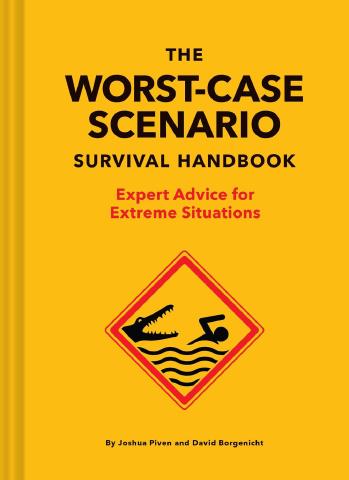After sharing an article from Alaska Department of Fish and Game about how to deal with aggresive moose, I got a recommendation for a survival handbook from my friend.

Cover of the book ‘The Worst-Case Scenario Survival Handbook’ by Joshua Piven and David Borgenicht
Finally finished reading it today, my first non-fiction book after a while. I don’t know how useful it would be, but I love this kind of book.
Some of my favourite highlights from the book:
Whatever the situation, whether you’re out in the mountains, on board a plane, or driving cross-country, to “survive” means “to outlive, to remain alive or in existence; live on. To continue to exist or live after.” After all, that’s what it’s really all about—about continuing to exist, no matter how dire the circumstances.
- You have to be prepared—mentally, physijcally, and equipment-wise.
- You must not ignore the importance of the mental aspects of survival—in particular, stay calm and do not panic.
- You must have a survival plan that considers the following essential elements: food, fire, water, and shelter (as well as signals and first aid).
And you just never know when things might take a turn for the worse. Or the worst.
Thankfully, the first key to surviving any worst-case scenario is simply this:
Do Not Panic.
Destroy your passport (unless you’re French). A passport will allow pirates to quickly identify you and demand ransom from family members; Americans, Brits, and citizens of other wealthy Western nations make appealing targets. Pirates are less likely to kidnap French citizens, due to the French government’s steadfast refusal to negotiate—and recent deadly counterattacks by the French military. If you speak French, use it.
High-risk search teams keep the following phrase in mind at all times: Look for the presence of the unusual or the absence of the usual
Admit your own fallibility, even if the gaslighter will not.
…
“We are all occasionally name-callers, or hypocrites, or incorrect in our beliefs—I am simply able to acknowledge to that. You seem unable to do so.”
Agree to disagree.
You will never win an argument with a gaslighter—just stay true to your own values and beliefs, and let the conflict subside.
Do not immediately assume that a clown is dangerous.
Is the clown on the street in broad daylight?
Likelihood: SAFE
Is the clown hiding in the woods, bushes, or a sewer drain?
Likelihood: DANGEROUS
The sun rises in the east and sets in the west—even in Australia.
Though seemingly impossible, begin to limit your time online. Start with five hours online a day, and slowly reduce time online by one hour a day for four days. Consider learning a new skill (cooking, painting, surgery) to fill your newly free time.
The longer the water boils, the more microorganisms that are killed. Beyond 10 minutes, however, no further purification occurs.
I thoroughly enjoyed their mix of useful trivia, I-probably-will-never-use-this information, examples and illustrations. And the sprinkled jokes here and there is the icing on the cake.
Reading the experts and sources also amaze me on all these peoples doing things that are extraordinary from my point of view.
Some new things I learnt from the experts section:
- tauromaquia: bullfighting.
- demolition derby: last man standing brawl with cars.
- psycho-proctologist: someone who tries to define the definition of assholes.
Looking forward reading more book like this!
Post 14 of #100DaysToOffload.